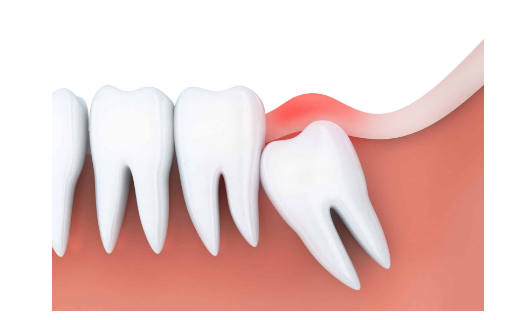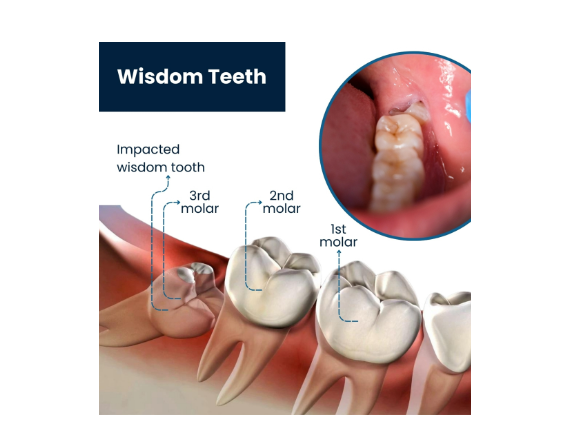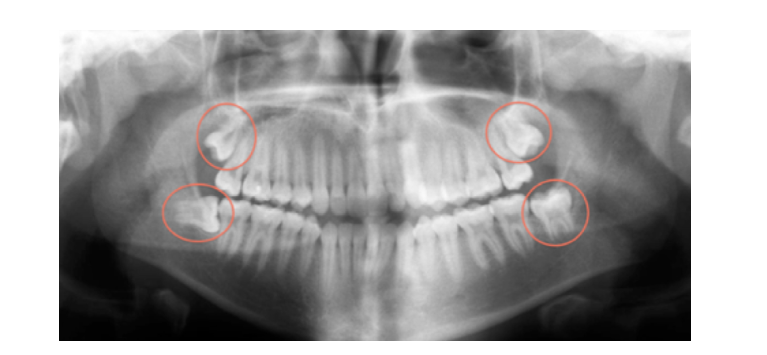By: Geraldus Sigap
Wisdom teeth are one of those dental mysteries that many people hear about but don’t fully understand until they experience discomfort or are told they need surgery. These third molars, often emerging in late adolescence or early adulthood, can either grow in perfectly aligned or become a source of pain and complications. Understanding their purpose and knowing when surgery is required can make all the difference in maintaining good oral health. In this article, we’ll explore the role of wisdom teeth, why they cause issues for many people, and when surgical removal becomes necessary.

Figure 1. Illustration of Wisdom Teeth
Wisdom teeth, also known as third molars, are the last set of molars to develop in the human mouth. Most adults have four wisdom teeth—one in each quadrant of the mouth. Anthropologists believe that these teeth were once crucial for our ancestors, who had a diet of tough, fibrous plant material and uncooked meat. The additional molars helped with grinding down food for digestion.
However, over time, as human diets evolved to include softer, cooked foods, the need for wisdom teeth diminished. With changes in jaw size and structure through evolution, modern humans often lack the space to accommodate these extra teeth. This evolutionary shift explains why so many people experience problems with their wisdom teeth today, including overcrowding, impaction, and misalignment.
While some people are lucky enough to have their wisdom teeth grow in without complications, this is not the case for the majority. As the human jaw has become smaller over the centuries, there is often not enough room for these extra molars to emerge properly. As a result, wisdom teeth can become impacted or fail to erupt fully through the gums, leading to various issues.
Common problems caused by wisdom teeth include:
- Impaction: Impacted wisdom teeth occur when they are trapped beneath the gum or bone, preventing them from fully emerging. Impacted teeth can lead to pain, infection, and cyst formation.
- Crowding: In cases where there isn’t enough room in the mouth, wisdom teeth can push against neighboring teeth, leading to misalignment and crowding of the teeth. This is especially problematic for people who have had orthodontic work, as the wisdom teeth can undo years of corrective treatment.
- Decay and Gum Disease: Partially erupted wisdom teeth are difficult to clean because they sit at the back of the mouth. As a result, food particles and bacteria can become trapped, leading to tooth decay and gum infections, such as pericoronitis.
- Cysts: In rare cases, impacted wisdom teeth can cause the development of cysts, which are fluid-filled sacs that can damage the surrounding bone and tissue if left untreated.

Figure 2. Illustration of Wisdom Teeth
Here are some common signs that wisdom teeth may need to be surgically removed:
- Pain or discomfort: Persistent pain in the back of the mouth is one of the most common symptoms of wisdom teeth issues. This discomfort can be caused by infection, pressure from the teeth pushing against others, or impaction.
- Swelling and infection: Swelling around the gums near the wisdom teeth or signs of infection, such as redness, tenderness, or pus, indicate a problem that likely requires surgical intervention.
- Damage to other teeth: If the wisdom teeth are crowding other teeth or pushing them out of alignment, this can lead to dental complications such as crooked teeth or bite issues.
- Cysts or tumors: As mentioned earlier, impacted wisdom teeth can lead to cyst formation. If a dentist detects a cyst during an examination, surgery will likely be recommended to remove both the tooth and the cyst to prevent further damage.
- Decay or gum disease: If wisdom teeth are partially erupted and difficult to clean, they become vulnerable to decay and gum disease. In these cases, removing the teeth can prevent future oral health issues
If surgery is recommended, it is natural to feel apprehensive. However, wisdom teeth removal is one of the most common dental surgeries, and advancements in dental technology have made the procedure safer and more comfortable for patients.
In some cases, particularly when wisdom teeth or other dental issues are suspected to be impacting neighboring structures, an MRI (Magnetic Resonance Imaging) can be used to provide a clearer view of the soft tissues surrounding the teeth. Unlike X-rays or CT scans, which primarily show bone, MRI can offer detailed images of soft tissue and help diagnose issues such as cysts, tumors, or infections that are not visible through other imaging techniques.

Figure 3. Rontgen of Wisdom Teeth
While wisdom teeth removal is a routine procedure, patients with cardiovascular issues may require special considerations before undergoing surgery. Dentists and oral surgeons should be informed about any heart conditions, and consultation with a cardiologist may be necessary to ensure that the surgery is performed safely. This is particularly important for patients who have had coronary artery bypass grafting (CABG) or stents placed, as the medication regimen they are on may impact healing.
It’s worth noting that while stents are commonly used to treat arterial blockages, CABG remains the preferred method for patients with extensive or hardened plaque, as it bypasses the blockages entirely. This holistic approach is often more effective in ensuring long-term cardiovascular health. At Abdi Waluyo Hospital, we offer comprehensive dental services, including wisdom teeth evaluation and surgical removal. Our experienced dental team, equipped with state-of-the-art technology, ensures that each patient receives personalized care tailored to their needs. We also have a specialized radiologist for detailed imaging, allowing us to provide accurate diagnoses and comprehensive treatment plans for patients with complex oral health issues.
If you’re experiencing discomfort from your wisdom teeth or want to schedule a consultation, our dedicated dental specialists at Abdi Waluyo Hospital are here to help you achieve optimal oral health. With our advanced imaging and surgical techniques, you can rest assured that you are in capable hands. Visit us today to take the next step toward a pain-free, healthy smile.
Resources
- What to Do About a Wisdom Tooth Infection – BDG [Homepage on the Internet]. [cited 2024 Sep 16];Available from: https://www.bostondentalgroup.com/blog/what-to-do-about-a-wisdom-tooth-infection/
- Brooklyn BFD| BD in. Ways to Relieve Painful Wisdom Teeth | Broadway Family and Cosmetic Dentistry [Homepage on the Internet]. 2024 [cited 2024 Sep 16];Available from: https://www.broadwayfamilydentalpc.com/blog/ways-to-relieve-painful-wisdom-teeth/
- When Should Wisdom Teeth be Evaluated? Vista California, Jon Shafqat, DDS, Inc. [Homepage on the Internet]. [cited 2024 Sep 16];Available from: https://www.shafqatoralsurgery.com/blog/when-should-wisdom-teeth-be-evaluated/
- Overview: Wisdom teeth – InformedHealth.org – NCBI Bookshelf [Homepage on the Internet]. [cited 2024 Sep 16];Available from: https://www.ncbi.nlm.nih.gov/books/NBK279591/
- Impacted wisdom teeth – Symptoms and causes [Homepage on the Internet]. Mayo Clin. [cited 2024 Sep 16];Available from: https://www.mayoclinic.org/diseases-conditions/wisdom-teeth/symptoms-causes/syc-20373808
